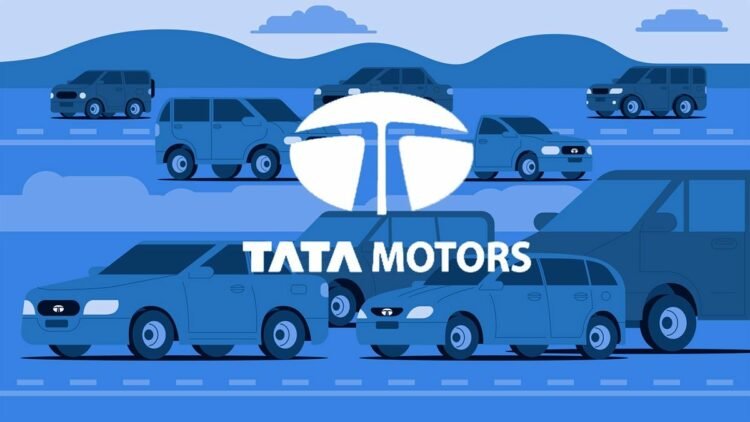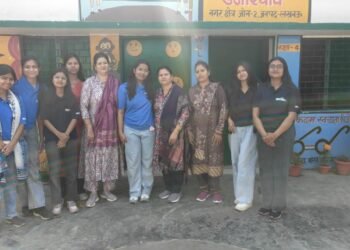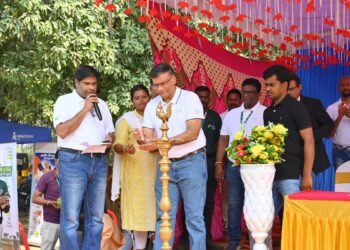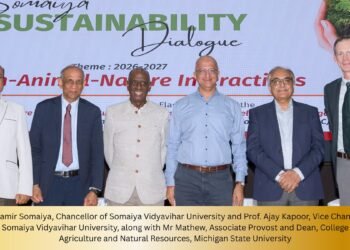NEW DELHI (India CSR): In a significant display of its enduring commitment to societal well-being, Tata Motors Limited voluntarily invested Rs 40 crore in Corporate Social Responsibility (CSR) initiatives during the Financial Year 2024-25. This substantial spending occurred despite the company having no legal obligation to allocate funds for CSR activities under Section 135 of the Companies Act, 2013, due to losses sustained in previous years. The decision underscores Tata Motors’ dedication to its founding philosophy of contributing to the community, a principle deeply rooted in the legacy of the Tata Group. The company’s initiatives reached over 1.33 million beneficiaries in FY25, focusing on key development areas and underserved communities.
Table: Tata Motors CSR Spending FY25
| Particulars | Details |
|---|---|
| Company Name | Tata Motors Limited |
| Financial Year | 2024–25 (FY25) |
| Total CSR Spending (Standalone) | Rs 26.31 crore |
| Total CSR Spending (Including Subsidiaries – TMPVL & TPEML) | Rs 40 crore |
| Legal Obligation to Spend on CSR | No (due to losses in previous years) |
| Total Beneficiaries Impacted | 1.33 million (13.3 lakh) |
| Tata Group Total CSR Spend (FY21–FY25) | Rs 7,550 crore (~$1 Billion) |
| Tata Group Beneficiaries in FY25 | Over 5 million |
| Core CSR Focus Areas | Health, Education, Employability, Rural Development, Environment, Biodiversity |
| Geographic Reach | Rural, semi-urban, and urban India |
| Water Security Program | ‘Amrutdhara’; 1,000+ villages, 4 lakh people impacted |
| Partnership with Govt. of Maharashtra | Restoration of 356 water bodies, 700 crore litres capacity, 7,000 farmers benefited |
| Health Initiative | Malnutrition Treatment Centre in Jharkhand |
| Livelihood Program (IVDP) | Implemented in 5 states; 20% income rise, 30% migration reduction |
| Affirmative Action (AA) Reach | 1.4 million individuals, 56% from SC/ST communities |
| Employee Volunteering Hours | 2 lakh hours |
| Growth in Volunteering (YoY) | 70% increase in per capita hours |
| Go Green Plantation Drive | 7.1 lakh saplings, 700 acres in Nagaland |
| Notable Environmental Projects | Project Maximus, Wetlands & Winged Voyagers, Nature-based Solutions (NbS) |
| CSR Committee Meetings Held in FY25 | 4 meetings |
| Governance Mechanism | CSR Committee with Independent Directors; Section 8 Company planned |
| CSR Reporting & Assurance | BRSR with reasonable assurance on Core Indicators |
A Foundation of Responsibility: Tata’s Enduring Philosophy
Long before corporate giving became a legal mandate, the Tata Group played a pivotal role in India’s development, shaping the nation through institution-building and contributions to economic and social progress. Tata Motors carries this forward with a philosophy that views the community not merely as a stakeholder, but as “the very purpose of its existence”. This ethos, championed by figures like Jamsetji Nusserwanji Tata, reinforces a commitment to improving the Quality of Life. The company’s CSR policy is fundamentally linked to being a responsible corporate citizen, dedicated to enhancing quality of life in communities surrounding its operations and beyond. This includes a particular focus on disadvantaged groups, such as Scheduled Castes, Scheduled Tribes, and other marginalized communities.
Voluntary Commitment Beyond Mandate
Under Section 135 of the Companies Act, 2013, companies meeting certain profit thresholds are required to spend a percentage of their average net profit on CSR activities. However, due to reported losses in earlier years, Tata Motors Limited (on a standalone basis excluding joint operations) was not legally bound to make such an allocation in FY25. Nevertheless, in line with its deep-seated commitment to the community and a desire to sustain and nurture social causes, the company voluntarily spent Rs 26.31 crore on CSR activities, as detailed in its standalone financial reports. The total CSR spend, including its subsidiaries TMPVL and TPEML, amounted to Rs 40 crore in FY25, impacting 14.78 lakh beneficiaries. This voluntary action highlights the company’s dedication to social responsibility as an integral part of its identity. The Tata Group as a whole invested over Rs 7,550 crore ($1 Bn) in CSR initiatives between FY21 and FY25, impacting over five million lives across India in FY25 alone.
Strategic Focus Areas and Expanding Reach
Tata Motors’ CSR initiatives are structured around five core thrust areas: Health, Education, Employability, Environmental Sustainability, Rural Development, and Nature and Biodiversity. These programs are designed for diversity and inclusivity, reaching communities in rural, semi-urban, and urban areas across the country.
A significant shift in FY25 was the evolution from a location-based approach to a national-level program. This strategic move aims to achieve economies of scale and foster deeper engagement with underserved communities. By forging strategic partnerships with state governments, Tata Motors is unlocking the potential to leverage government schemes, enhancing the reach and impact of its CSR programs. An example includes partnering with the Government of Maharashtra to rejuvenate and restore 356 water bodies across 10 districts, leveraging a government water security scheme to enhance water capacity by 700 crore litres and benefit 7,000 farmers.
Impactful Programs in Action
The company’s commitment translates into tangible impact through various programs:
1. Water Security: Through its ‘Amrutdhara’ National Drinking Water Programme, operational since 2010, Tata Motors supports communities residing in water-stressed hamlets. This involves building wells and reservoirs, helping recharge groundwater, and reviving old water management systems. The program has impacted over 4 lakh communities across more than 1,000 villages, mostly tribal areas in India. Efforts are also underway to use treated effluents and rainwater harvesting to achieve ‘Water Positive’ status in all operations and townships by 2030.
2. Health and Nutrition: Tata Motors supports a Malnutrition Treatment Centre (MTC) in Jharkhand in collaboration with the state government, contributing to maternal and child health services in remote areas.
3. Livelihood and Employability: The flagship Integrated Village Development Initiative (IVDP) focuses on holistic engagement with rural communities. Piloted in Palghar, Maharashtra, IVDP has been replicated across four states and in Shravasti, Uttar Pradesh, one of the lowest-ranked districts in socio-economic development indicators. This initiative has led to a 20% increase in annual income for villagers through sustained livelihood generation activities and a 30% reduction in migration in search of alternate employment.
4. Affirmative Action (AA): Addressing social inequalities, Tata Motors’ Aadhaar framework focuses on Scheduled Castes (SC), Scheduled Tribes (ST), women, and persons with disabilities (PWD). In FY25, AA initiatives positively impacted 1.4 million individuals from underserved communities, with a significant 56% belonging to SC/ST communities. The company dedicates 40% of its community engagement resources to AA and business drives Employment and Entrepreneurship initiatives under this framework.
5. Environmental Stewardship and Nature Conservation: Aligned with the Tata Group’s ‘Aalingana’ initiative, focusing on net-zero emissions, circular economies, and biodiversity, Tata Motors integrates environmental stewardship into its CSR. Nature-based Solution (NbS) projects are undertaken beyond operations, with potential for impact at scale. Examples include:
6. Wetlands & Winged Voyagers: Wetland conservation around plants to secure critical habitats for migratory birds along the Central Asian Flyway.
7. Project Maximus: Asian elephant conservation in Jharkhand and the Nilgiri Biosphere Reserve, addressing human-elephant conflict and conducting science-based studies.
8. Go Green: A community-led plantation project in Nagaland, where 7.1 lakh saplings have been planted and protected across 700 acres, restoring degraded lands and securing indigenous livelihoods.
Employee Engagement: The Human Capital of CSR
Employee volunteering is highlighted as a cornerstone of Tata Motors’ CSR culture. Employees are actively encouraged to contribute their time and skills to societal development. In FY25, employees volunteered Rs 2 lakh hours, and the per capita volunteering hours increased significantly by 70%, reflecting stronger employee engagement in social initiatives.
Governance and Transparency
Tata Motors maintains a transparent approach to its CSR activities, guided by a dedicated CSR Committee. The committee comprises Independent Directors and the Executive Director and holds regular meetings (four in FY25) to review and approve initiatives.
The company’s CSR policy is publicly available on its website. Plans are underway to form a Section 8 Company to consolidate the CSR activities of Tata Motors Group Companies, which is expected to enhance focus and efficiency.
The Business Responsibility and Sustainability Report (BRSR), including details on CSR initiatives, is available as a separate section of the annual report, and the company has obtained reasonable assurance on BRSR Core Indicators.
Looking Ahead
By prioritizing the needs of the underserved, leveraging strategic partnerships, and integrating environmental goals with community benefits, Tata Motors continues to evolve its CSR approach.
The voluntary spend in FY25, despite the absence of a legal mandate, demonstrates a deep-seated commitment to building sustainable communities and contributing to national development, carrying forward a legacy of responsibility that defines the Tata brand.
FAQs: Tata Motors Voluntarily Invests Rs 40 Crore in CSR Initiatives in FY25
1. Did Tata Motors have a legal obligation to spend on CSR in FY25?
No, Tata Motors was not legally required to spend on CSR in FY25 due to losses in previous years but chose to invest voluntarily.
2. How much did Tata Motors spend on CSR initiatives in FY25?
Tata Motors spent a total of Rs 40 crore on CSR activities in FY25, including its subsidiaries.
3. How many people benefited from Tata Motors’ CSR programs in FY25?
Over 1.33 million people benefited from the company’s CSR initiatives during FY25.
4. What are the key focus areas of Tata Motors’ CSR activities?
The main focus areas include Health, Education, Employability, Environmental Sustainability, Rural Development, and Nature Conservation.
5. How does Tata Motors involve its employees in CSR?
Employees volunteered around 2 lakh hours in FY25, reflecting strong engagement in CSR initiatives.
(India CSR)






















